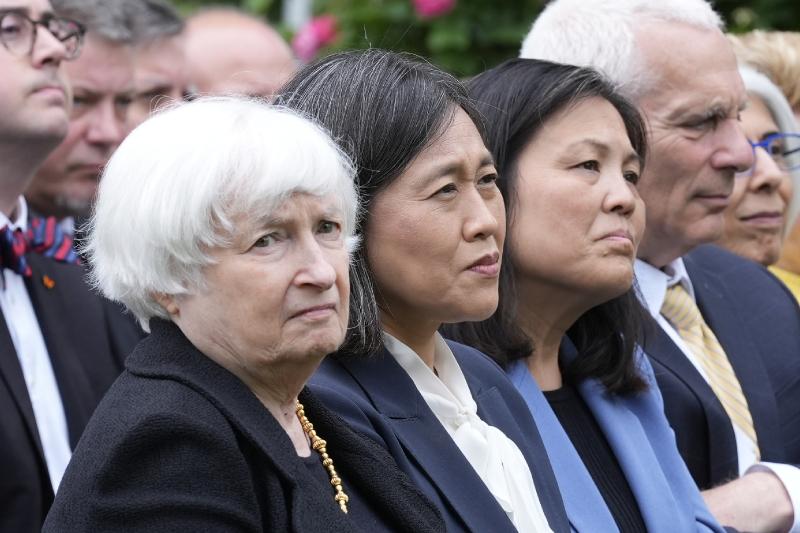DC slammed Trump’s tariffs. Biden’s decision to keep them draws a very different reaction.
By: Gavin Bade


And what do we call this class?

B ack in 2018, lawmakers of both parties greeted President Donald Trump’s decision to slap tariffs on Chinese imports with widespread derision.
Six years later, most members of Congress are applauding President Joe Biden’s extension — and in some cases, expansion — of those tariffs, if not calling for him to go even further.
The contrasting reactions to similar policy moves just a few years apart is yet another reminder of just how much the U.S. political consensus has shifted against free trade. And it bodes ill for those hoping Washington will be more open to negotiating new trade deals and cutting tariffs after the 2024 election.
“It’s a terrible, unfortunate movement towards protectionism,” Sen. Chuck Grassley (R-Iowa), one of the few lawmakers to critique Biden’s move, told POLITICO when asked why Washington’s reaction has been so different this time around.
Besides Grassley, free trade advocates have remained largely silent. Far more typical was the response from Michigan Republican Rep. John Moolenaar , the new chair of the House Select Committee on China, who called Biden’s move “overdue.”
“Congress and the Administration must be ready to work in a bipartisan manner to strengthen our economy while supporting American farmers and workers who face retaliation from the [Chinese Communist Party],” Moolenaar said in a statement.
The move, which Biden and his aides had telegraphed in remarks earlier this spring, was promptly condemned by leading trade groups, including those representing the U.S. tech industry and large importing corporations.
But they barely elicited a peep from free traders in Congress, a dwindling population in recent years. Grassley, a 90-year-old with few reelection concerns, was one of the only lawmakers to slam Biden on tariffs, saying he was making an “election year-decision that risks serious retaliation against American producers — especially agriculture, as we’ve seen before.”
That used to be a mainstream position in the GOP, which for much of the past 40 years defined itself as pro-business and pro-free trade. But Grassley, the most senior member of the Senate, is increasingly an outlier in his party, which has grown far more populist and protectionist in the wake of Trump’s 2016 presidential victory.
In that sense, they’ve converged with the American left, which has long criticized free trade as boosting big corporations at the expense of workers. The Democratic party’s center of gravity has increasingly moved in that direction, as well, with Biden taking a number of trade cues from lawmakers like Sens. Sherrod Brown (Ohio), Bob Casey (Pa.) and Tammy Baldwin (Wis.) who are up for reelection this year and pushed Biden this month to increase the tariffs on China.
All three of those lawmakers welcomed Biden’s move on Tuesday, while Brown pushed him to go further and enact an outright ban on Chinese vehicles entering the U.S. The administration should issue rules, he said, that include “prohibitions on finished vehicles and technology that is designed, developed, manufactured, or supplied from the People’s Republic of China.”
Democrats who had opposed tariffs on clean energy products in the past were, by contrast, more taciturn on Tuesday. Sen. Jacky Rosen (D-Nev.), who had lobbied Biden to pause solar tariffs two years ago, stopped short of criticizing the president’s decision to slap 50 percent tariffs on solar products from China.
“I think we just have to be cautious that we don't impact what's happening now,” in terms of solar power growth in the U.S., Rosen said on Capitol Hill. “We're going to keep our eye on [the issue] and see what else we have to do.”
There were some exceptions to the protectionist narrative among Democrats on Tuesday. Colorado Gov. Jared Polis — seen as a potential Democratic presidential candidate in 2028 — was one of the few Democrats Tuesday who decried Biden’s tariff move, calling it “horrible news for American consumers and a major setback for clean energy.”
“Tariffs are a direct, regressive tax on Americans and this tax increase will hit every family,” he wrote in a social media post.
Comments like those used to be commonplace in Washington in response to tariffs — even from Biden himself. Back in 2019, he slammed Trump’s decision to impose tariffs on China — the same tariffs he preserved this week — as “shortsighted.”
“All that [Trump’s] delivered as a consequence of [his tariffs] is American farmers, manufacturers and consumers losing and paying more,” Biden said during a campaign speech at the City University of New York.
But now, those arguments are scarce in Washington, even from Republicans who have pushed Biden to embrace more free trade policies. Rep. Adrian Smith (R-Neb.), the head of the Ways and Means trade subcommittee, has routinely said he is “no fan of tariffs” and introduced a bill on Tuesday that would renew a long-expired tariff exemption program.
Even so, he decided not to criticize Biden for raising tariffs in a Tuesday statement, instead arguing that the administration should be “rolling back policies harmful to American consumers like electric vehicle mandates” and “engaging with willing partners around the world to reduce trade barriers through enforceable trade agreements.”
Those Republican arguments are taking a cue from their party’s protectionist-in-chief: former President Trump, who slammed his 2024 rival for pursuing electric vehicle mandates. He’s also said he’s prepared to go much further than Biden to protect domestic EVs, by imposing steep tariffs on auto imports from Mexico , where Chinese companies are building electric vehicle plants.
Trump-aligned lawmakers on Capitol Hill parroted that argument on Tuesday, with Sen. Marco Rubio (R-Fla.) calling Biden’s tariff decision “half-baked.”
“It is imperative that any updated tariff regime adequately address the extinction-level threat that Chinese vehicles — both internal combustion engine and electric — pose to American automakers and the workers they employ,” he said in a statement.
Both Trump and Biden are touting their tariff policies as they try to woo working class voters in the industrial Midwest — which has been hit particularly hard by the rise of free trade and the outsourcing of manufacturing jobs — and other swing states. Support for foreign trade dropped, nationwide, after the Covid-19 pandemic exposed key chokepoints for supplies like medical equipment, baby formula and even toilet paper.
The shift toward protectionism “comes from the grassroots,” Grassley said — “America First stuff for Republicans, and for Democrats, union outrage.”
Other lawmakers say that lessons learned since Trump first imposed tariffs on Chinese goods have convinced them Biden’s decision is the right move.
Michigan Sen. Debbie Stabenow , who attended Biden’s tariff announcement on Tuesday, said that she was concerned about Chinese retaliation against American agriculture when the tariffs were first imposed, but now sees the threat of Chinese subsidies as too big to ignore.
Back in 2018, “The concern was that backlash [from China] on agriculture and food,” said Stabneow. But since then, “I've seen the impact of what the Chinese are doing. They are consistently undercutting manufacturing in all parts of [our] economy by either owning or heavily subsidizing what is done in their country.”
Other Democrats argued that Biden is being more selective with his tariffs than Trump.
“Biden's tariff approach is not out of personal anger, it's about a thoughtful way to support the development of domestic industry,” said Sen. Elizabeth Warren (D-Mass.). “There's a coherence to what President Biden is trying to do that just wasn't there in the Trump years.”
Even members of Biden’s own administration who have advocated for lower tariffs — like Commerce Secretary Gina Raimondo and Treasury Secretary Janet Yellen — have backed down on those arguments as the election approaches, cognizant of how popular tariffs are in swing states like Michigan, Pennsylvania and Wisconsin.
“From a policy viewpoint, there are some in the administration who want to see tariff reductions,” one former Biden official told POLITICO earlier this month , as the administration put the finishing touches on its tariff decision. “But given where we are in the political cycle, that view is being outweighed.”
The abrupt shift in trade attitudes in Washington has left corporate America in an unfamiliar — and uncomfortable — position of isolation.
“In an election year it’s not surprising, but still disappointing that there aren’t more profiles in courage calling out the limits and costs of these tariffs,” said Jake Colvin, head of the National Foreign Trade Council, which opposes the tariffs, writ large. “The silence from politicians is allowing this fiction to take root that tariffs are going to save American industry from foreign competition, and that’s dangerous.”
Meredith Lee Hill and Ari Hawkins contributed to this report.
Trolling, taunting, spamming, and off topic comments may be removed at the discretion of group mods. NT members that vote up their own comments, repeat comments, or continue to disrupt the conversation risk having all of their comments deleted. Please remember to quote the person(s) to whom you are replying to preserve continuity of this seed.
No Trump, Fascism References, Memes, Source Dissing.











So it seems ONCE AGAIN, Trump was right...........hypocrites
Literally...never.
Perhaps you missed the “ONCE AGAIN”. Look at the history of a lot of his “predictions.
Chinese EVs are good for the world to reduce global warming except in the US.
China isn't particularly phased by Biden's move. Here is an article from today's China Daily indicating China's attitude towards it.
LINK ->
The experts in the article explain the reasons for their opinion. In my relatively clueless opinion, all it's going to do is cost American consumers more, feeding inflation, making life less affordable. And let's see if China bothers to retaliate with something that would hurt Americans even more - China might not, might just brush it off like a fly landing on your arm. I consider Biden's move to be an economic Pyrrhic Victory at best, and you know what the end result of a Pyrrhic Victory is, don't you.